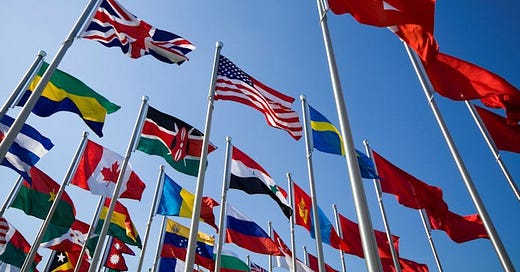A front-page editorial in the state-owned China Securities Journal is getting credit for fueling a strong rally in Chinese markets overnight that spread to global equities. Shanghai stocks jumped 5.7%, after the publication said investors should look forward to the “wealth effect of the capital markets” and the prospect for a “healthy bull market.”
The Bank of Japan now owns almost half a trillion dollars in Japanese stocks. The Swiss National Bank owns over $125 billion in stocks. Why do the media and institutional investors poke fun at Robinhood traders when they are simply following in the footsteps of government policy? Governments around the world are plunging into stock investing about as fast as any retail trader. And it is not just ownership of stocks that is new, but the dramatic in your face public support for stock markets.
In May, when Jerome Powell came on the news program 60 Minutes to basically say he would do everything and anything to support the markets, I believed him. It was as clear a signal as any that the most powerful central bank in the world had the stock market’s back. This was on top of the government fiscal stimulus that was unprecedented in its speed and scope in response to the COVID pandemic. If he was alive this year, I could only imagine what Marty Zweig (his famous line: “Don’t Fight the Fed”) would have been telling his clients and investors.
But while COVID may have quickened the pace and expanded the size, the trend towards government involvement and support for the financial markets has been growing and expanding for decades.
It used to be bailouts in bankruptcy or holding the line and protecting the banks (at least in the US). Now we have moved on to protecting and supporting other industries (i.e. airlines, auto manufacturers) as well and even buying the debt of specific companies. This is in addition to tremendous and seemingly unlimited liquidity into the financial markets.
Sacré bleu, even France is getting in on the action. The country is trying to position Paris as a financial capital in the wake of Brexit, has privatized its national lottery and made a number of efforts to boost public participation in French equity markets. I wrote about the newly privatized French lottery in this post: Betting on France's gambling monopoly.
I don’t necessarily want to dwell on whether this is right or wrong. Nor do I want to give doomsday predictions of how this will end in tears. No, instead I want to consider what may come next.
Here are some thought experiments:
1. If governments are actively buying other countries’ stocks, could they short sell them? Could foreign governments engage in a bear raid to damage an economy or a particular company?
2. Should we be worried about what may happen if a foreign government decides they want to sell their portfolio for something unrelated to the performance of its holdings? International political crises may take on new financial implications.
3. Will governments start to monitor and restrict investments from other government and quasi-government entities?
4. Can politicians and particularly Presidents allow stocks to fall? Will the new Robinhood investors represent a political class that politicians will need to bend an ear to and one you will not want to upset? Has this already happened?
5. Will the U.S. government or Federal Reserve buy stocks in the next crisis?
I have no idea if any of this will or won’t happen. I just know we are in uncharted waters and more intervention/action is likely, not less.
What stops or limits governments’ ability to buy stocks and prop up their stock markets? This may be the most important question to answer. The ability to understand and hedge this risk will create the next superstar money manager if it comes to pass that a prominent government withdraws its support of its market.
Conversely, as other countries like France join the stock market party and actively support their markets, there may be enormous upside as their balance sheets come to bear in order to boost their markets. This is one more reason beyond lower valuations to consider investing outside the U.S.
The governments of the world are now the new heavy weight hedge funds, what comes of it, I don’t know, but stock market nationalism is here. The political wind is blowing in the stock market’s favor. How long this trend lasts may be the investment question of the new decade.




